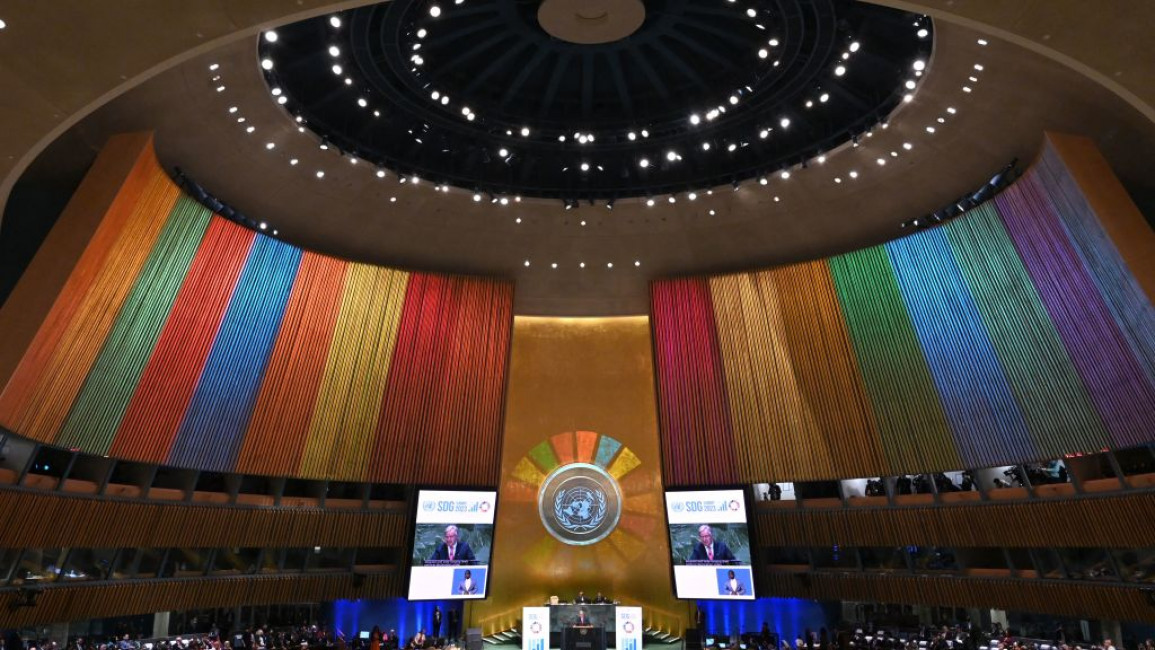Can Saudi Arabia and the EU revive Palestine-Israel talks?
An Arab-European forum hosted by Saudi Arabia on Monday in the run-up to the UN General Assembly session discussed ways to revive the peace process between the Palestinians and Israel, as Riyadh warned that hopes for finding a two-state solution were fading.
The so called "Peace Day Effort" took place a day before 78th session of the General Assembly in New York that leaders of at least 140 states are scheduled to attend, with climate change, conflicts, economic instability, and more hot topics on the agenda.
Attended by around 50 states, the Saudi forum was also sponsored by the Arab League and the EU and joined by Jordan and Egypt, two states which have a peace treaty with Israel and historically have played active roles in the Israel-Palestine issue.
It comes amid reports that Saudi-Israel normalisation talks are continuing although Riyadh officially rejects any deal with Israel before Palestine statehood is granted.
In a televised statement after the meeting, broadcast by Saudi media, Foreign Minister Prince Faisal bin Farhan said the forum aimed "to revive the conversation about the two-state solution… in light of the Israeli escalation in Palestinian territories."
"People have begun to lose hope in the two-state solution, and we want, through efforts, to bring it back to the forefront," the foreign minister said.
"There is no way to resolve the conflict except by ensuring the establishment of an independent Palestinian state," he added.
Saudi Arabia's recent decision to appoint its first ever ambassador to Palestine amid ongoing normalisation talks sends a clear message to both the US and Israel that a deal is only possible if Saudi demands are met. https://t.co/5yVNnObw1S
— The New Arab (@The_NewArab) September 16, 2023
Israeli-Palestinian peace talks have been dormant since 2014, and increased Israeli violence in Palestinian territories have further complicated chances of a return to them.
Settlement expansion policies in the occupied West Bank by Israel’s far-right government are also a major obstacle. Israel has refused to back down on settlement building.
Egyptian Foreign Affairs Minister Sameh Shoukry said his country remained committed to working with regional and international partners to reach understandings that pave the way for the resumption of direct talks between the Palestinians and the Israelis – but he called on Israel to "stop taking unilateral measures that hinder the peace process."
Top EU official Josep Borrell said on Monday that peace between the Palestinians and the Israelis "does not seem any closer" 30 years after the signing of the Oslo Accords.
The High Representative of the European Union for Foreign Affairs and Security Policy warned that conditions were deteriorating on the ground, and pointed to the increasing number of settlers in the West Bank and East Jerusalem.
"The two-state solution requires great efforts if we want to implement it, and everyone must support it with practical steps," Borrell told Ibtisam Azem, correspondent for The New Arab’s sister site Al-Araby Al-Jadeed.
"We see that the conditions on the ground are deteriorating everyday with regard to the Palestinian-Israeli conflict, and we are concerned about the fate of the Palestinians, and the effects of this conflict on Israel’s security," he said.
Palestine’s Ambassador to the UN, Riyad Mansour, said guaranteeing international protection for the Palestinians was not impossible. More than 200 Palestinians have died since the start of this year because of attacks by Israeli forces and settlers in the West Bank and Gaza Strip.
Hundreds more have been injured or arrested.
Analysis: While Saudi demands for US weapons and nuclear energy are real, Riyadh is also likely testing the water to see what's possible in Washington as the costs of normalising ties with Israel still far outweigh the benefits
— The New Arab (@The_NewArab) July 11, 2023
✍️ @GiorgioCafiero https://t.co/KD4AaKUNPO
"It is time for us [Palestine] to be given full [UN] membership, especially since there is a consensus on the two-state solution," Mansour told Al-Araby Al-Jadeed, indicating that Palestinians were being unfairly treated because Israel already had full membership status.
"Therefore, any issues related to ending the occupation, and achieving independence and national rights for the Palestinian people, must take place between two states," he said, adding that the meetings – which will be attended by Palestinian President Mahmoud Abbas – will also address settlement issues, refugee rights, and other topics.
In a joint statement, the participants of the forum announced incentives for the Palestinians and Israelis once they reach an agreement, in what they called a "Peace Supporting Package."
"It seeks to produce detailed programmes and contributions, conditional upon achieving a final status agreement, that will support the peace, and ensure that all peoples of the region reap its benefits. The effort seeks to ensure that Peace Day is a day of opportunity and promise, thus incentivising earnest efforts to reach it," the statement read.
Working groups were also announced and tasked to produce "realistic and feasible components" of the package.
"Unless the viability of the Two-State Solution is preserved, and negotiations to achieve it start, the prospects for peace will further diminish, and conflict will characterise the future of the region as much as it has marked its past," the statement warned.



![Bahrain [getty] Bahrain [getty]](/sites/default/files/styles/image_330x185/public/media/images/5F28B59A-942B-4B6A-A5A8-09D476D1E68D.jpg?h=d1cb525d&itok=NJNXWh5z)